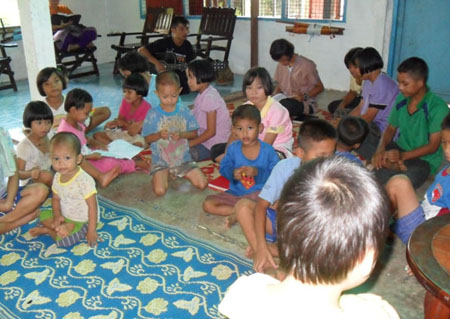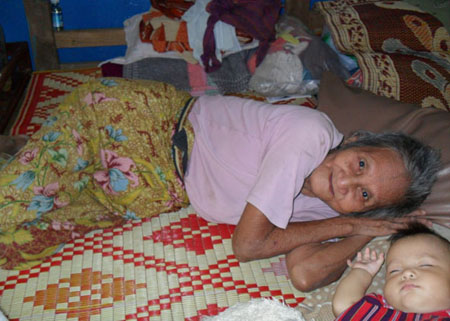Lu Lu, who lives in Huaymalai village in Sangkhlaburi Township, Kanchanaburi Province, Thailand, has been taking care of orphans, old people (who are not cared for by their children ), physically disabled people, blind people, HIV infected patients, and mentally disturbed people. She has been taking care of Mon, Karen, Burman, Arakanese, Shan, Lahu as well as foreigners including Malayian, Cambodian, Chinese, Indian, and Bangladeshi.

She opened a Safe house in 1993. She has taken care of over 1,600 patients since 1993. Most patients are HIV infected and psychiatric patients. She is giving them hope.
So, I would like to write about her.
SayarmaNaw Paw Lu Lu moved to Thailand in 1981 and opened a Safe house in 1993. This Safe house is 18 years old now.
She spoke about her experiences during a recent interview with KAOWAO News
Question: Can you tell me a briefly about your birthplace and family?
Answer: I was born in Taung-oo Town, Bago Region. Now, I am 63 years old. My mother’s name was Daw Nu and my father was U Saw Bwar. My husband’s name is Nan Doh (a) Win Myaing. He is 61 years old. We have four daughters, one son, and four grandchildren.
Question: can you tell me the name of your children and their job?
Answer: My eldest son name is Chana, age 33 and he is working at theHuaymalai Children's Home (which was opened by SayarmaNaw Paw Lu Lu in 1993. My eldest daughter’s name is Kanda (a) Hser Lwi Htoo, age 3. She is working with MSF (Medicine Sans Frontieres). The second daughter is Paw De Lay Sar (a) Naung Lit, age 27. She is not very good in health. The third daughter is Hsai Ru (a) Naw Leh Htoo Kapaw, age 24 and she works with me. She manages the day to day operations of the Safe house. The fourth daughter is Su Yi Paw (a) Naw Dah Baleh, age 22. She is still studying as a senior student (fourth year) in a Nursing College, in Kanchanaburi Province, Thailand. Except for the youngest child, all of my children are living in this village.
Question: why do you open this Safe house? What is the purpose?
Answer: At first, we were illegal migrants in Thailand. We fled to Thailand because of war. Then a women’s organization, the Sangkhlaburi Christian Women team built this house.

We opened this house when we attended leadership training for women. At that time, Thai police arrested illegal migrants and deported them back to the Thai border. These people didn’t have a home here at the border. They didn't know where to go. Some migrants were sold. Some migrants were sexually abused. Some used methamphetamine tablets. Some women were forced to divorce. These women had to take care of their children as well as working as house maids. So, many developed psychological disorders. Some migrants lived in the village, others went into the jungle and some migrants died. The Women’s Organization saw this scene and discussed it with the TBBC (Thai Burma Border Consortium), and they opened the Safe House. The Women’s Organization appointed me to take care of the patients.
Question: What kind of patients are staying in this Safe house?
Answer: HIV infected, some with psychological disorders who don’t remember their background, their family, their home and so on. They don’t remember anything about themselves. Others are paralyzed, have malaria, asthma, are disabled or blind. Among them, the number of HIV infected and psychiatric patients are the most. Currently, there are 47 patients staying in this Safe house. Another three patients stay outside but we provide food to them. If we count the patients from the time this house opened, there are over 1,600 we have taken care of. Some people stay in this house for a short time. Thai police arrest migrants and deport them. So, they stay in our house for a short time. They go back to their home after they make contact. Some people don't have a home. So, they stay in this safe house.
Question: Do you help patients from any race?
Answer: Well, I help people from various races. I help Mon, Karen, Burman, Arakanese, Shan, Lahu from Burma and Thai, Malaysian, Cambodian, Chinese, Indian, and Bangladeshi people.
Question: how many Thais stay in your safe house? Why do they come here?
Answer: There are over 10 Thai patients. Most of them are psychiatric patients.They don't remember where their home is. As well, they cannot remember their background. So, they cannot go back to their home. They wander around; they stay on the street; they don't have food. So, some locals brought them to our Safe house. Then I take care of them and give them medication. I also try to contact their family as well as inform theThai police. However, the police do not take any responsibility. They have told me to take care of them. So, I tried to contact their families with the help of TBBC. However, I cannot contact all families. And, even when I get a contact with some families, they are very poor and cannot afford to bring their relatives to their homes. So, this kind of family requests that I care for their relatives. So, we continue to take care of them in our Safe house.
Question: Please tell the reader about the long-term patients?
Answer:Some mentally ill people recover again. However, some patients have been here in the safe house since they arrived.
Some old people, with nobody to take care of them, requested to stay here. For me, I couldn't take care of my father and mother very well because we moved from place to place (because of the war). I have wanted to take care of aged people. When I met three grandfathers, who didn't have anybody to take care of them, I wanted to take care of them, especially when they’re sick. I discussed it with my friends and opened a house for elderly people with US $ 500.
Question: How many aging people stay in this house?
Answer: there are 12 older people. They don't have a house to go back to, except one person (grandmother). However, her children are very poor. They don't have any documents to live in Thailand. They cannot afford to take care of her so they requested that I take care of their grandmother. So, I provide food, shelter and medicine to her.

Question: Why did you open the Huaymalai Children's Home?
Answer: Some patients have children. I think children should not stay together with mentally ill patients. If they stay with patients in the safe house, these children will have problems. So, I decided to open a house for children.
Question: how many children are staying in the children's home?
Answer: There are 31 children. Half of them are orphans. Some children only have a mother but the mother is mentally sick. Some children only have father but the father is disabled. Some children's mothers are HIV infected.
Question: Who supports you?
Answer: At the beginning, the TBBC (Thai Burma Border Consortium) provided funding for medicine, salary, food and other needs. Some of my friends, who work in religious groups managed to teach patients how to make crafts. A friend bought cotton fiber for weaving. At first, it's very difficult to teach them because most patients are mentally ill. However, I think if we can teach animals, we can teach people. Now, they can do beginner level weaving. It's not so bad. Weaving calms their mind. They are also happy because they get some money from weaving. They can buy something with their own money.
Question: DO you have everything you need?
Answer: Currently, we get enough support but we want to buy a plot of land because this house and land is not ours. We rent this property. Sometimes, the land owner permits us to grow vegetables but other times he does not. It's difficult for us when the owner changes his mind. Another problem is that we cannot construct any buildings without the owner's consent, even if we need another building. I want separate buildings for the different patients. For instance, we want a house for mentally ill people; another house for HIV infected people and another for disabled people. Sometimes we have to put mentally sick people and disabled people in the same room. Sometimes the mentally ill person has attempted to escape from the home, so we had to lock them in the room. Sometimes they talk aggressively to other people and disturb other patients who cannot sleep in the room. Sometimes a mentally ill person beats other people. So, I want to separate them.
If there is a donor, we want to buy a plot of land. If we have a plot of land, patients can cultivate some vegetables. It's kind of helping them to be stable in their mind. If we can do this (cultivate plants), somehow it will provide something good for us. If we own a plot of land, we can build new buildings and patients can stay in separate rooms. Also, we can manage to earn some income.
Question: Sayarma, do you have permission from the Thai authorities to keep this house open?
Answer: In the beginning, it was not ok. We are not Thai citizens. Most patients are also stateless people. So, we had a lot of difficulties. However, the Thai authorities recognize the value of our work to the community.
If some mentally ill person was to set fire to a house or steal things or a mentally ill woman walks the street and sleeps with a man, it makes problems for them (the authorities). So, if authorities find a mentally ill person, they bring them to our Safe House.
As well, we make list of our patients and send it to them. So, now it's ok with them. We don't have any problems with them.
Question: what would you like to say to our readers?
Answer: We have many problems. Many people look down on and ignore our patients. Some patients have many reasons to come to this safe house. Some patients have their own problems in their home. So, they come to here. Therefore, I would like to urge other people to sympathize with them and to help these patients.
Everybody has their own problems.Other people should have sympathy for this person. We have to take care of them because they don't have any home to go back to. Nobody wants to accept them. So, I would like to say even if you cannot help us directly, perhaps you can urge other organizations or private donors to help us. We need a plot of land and new buildings for these patients.
I would like to say thanks to the organizations which help us. I want this safe house to run under a registered organization.
As well, Burmese people illegally migrate and work in Thailand, Malaysia, Singapore, and China. However, they face many problems when they work in these countries. We can see the root of this problem comes from political, social and economic problems in Burma. For instance, there is no democracy in Burma; there are no jobs for them in their own country; human traffickers exploit them and some of them are sold.
If you want to contact Sayarma Paw Lu Lu:
Paw Lu Lu
54/p
Sangklaburi District
Kanchanaburi Province, 71240
Thailand
SangklaburiSafe house is for patients and elderly people.
Huaymalai Children's Home is for children.


